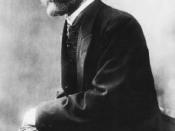The flogging, branding, torturous style of punishment seen before the eighteenth century is a long way from the delivery of punishment that began to emerge during the eighteenth and nineteenth centuries. Methods of punishment underwent significant changes and penalties moved away from infliction of pain on the body of the person and imprisonment became the preferred way to punish.
This essay aims to identify the individual perspectives created in the minds of sociologists and compare each theorist's account of why prison became the preferred method of punishment. Each theorist has a different idea on why this was the case however shared in the same view that punishment had become less punitive in its measures.
The main theorists analysed in this essay are Durkheim, who focuses on the positive, solidarity enhancing functions of punishment. Rusche and Kirchheimer who focused on the functional relationship between the economic organisation of society, its labour supply and prison as a form of punishment.
Foucault believed that punishment as prison enhanced the development of more repressive and pervasive forms of state control over an individual. Elias brought a unique view towards the history of punishment in that he introduced the idea of the civilising process. Finally Ignatieff held a revisionist account of penal history and challenged the idea that punishment became more humane over time.(Hudson, 1996)
Firstly I will discuss Durkheim's contribution to sociological theory of penal history. The work of Durkheim is now conventionally described as a Functionalist approach. The Functionalist believes that each part of the whole has a part to play in maintaining the continued existence of society as a whole. Durkheim believed that 'Crime brings together honest men and concentrates them (Durkheim, 1901)'. His stance recognised that crime was necessary to the well being of society and proposed...


